The Ultimate SEO Guide for Lawyers: Boosting Your Online Presence

Every lawyer knows that the most compelling cases aren’t necessarily the loudest; they’re the ones that leave an indelible mark on the jury’s mind.
In the vast and bustling digital metropolis, law firms aren’t just competing for a verdict; they’re vying for visibility in a landscape where billboards have been replaced by browser windows and town criers by tweets.
Amidst this digital hustle, even the sharpest legal minds can feel lost in the crowd, their messages submerged in a relentless sea of online chatter. But what if your law firm could break through this digital din? We’re here to help you do just that today!
Join us as we let you in on the top search engine optimization (SEO) strategies for lawyers. We’ll delve deeper into the importance of SEO for lawyers, reveal our cards, highlight the importance of professional SEO services, and help you make the right move to give your law firm a power-packed boost in online visibility.
The gavel’s about to drop; let’s make sure it’s in your favor!
1. The Power of Keywords
Venturing into the vast expanse of the internet without a focused strategy is akin to a ship setting sail without a compass; both are bound to drift aimlessly in the vastness.
Think of keyword research as a compass for lawyers aspiring to carve out a digital presence. It’s a great way to pinpoint the exact phrases and terms potential clients are plugging into search engines.
Keywords are specific words or phrases people use to find information, products, or services on search engines like Google.
Here’s an example.
Let’s say someone’s facing a complex family law issue and requires legal assistance. They may type in a search query like “divorce attorney for child custody” or “how to navigate divorce proceedings with children.”
These search phrases reflect the user’s specific needs and concerns. Lawyers specializing in family law can incorporate these relevant keywords into their websites to start ranking for these search results.
This is an integral part of every successful law firm’s SEO plan. Let’s test it! We entered “divorce attorney for child custody” into the Google search bar and stumbled upon the following search results:
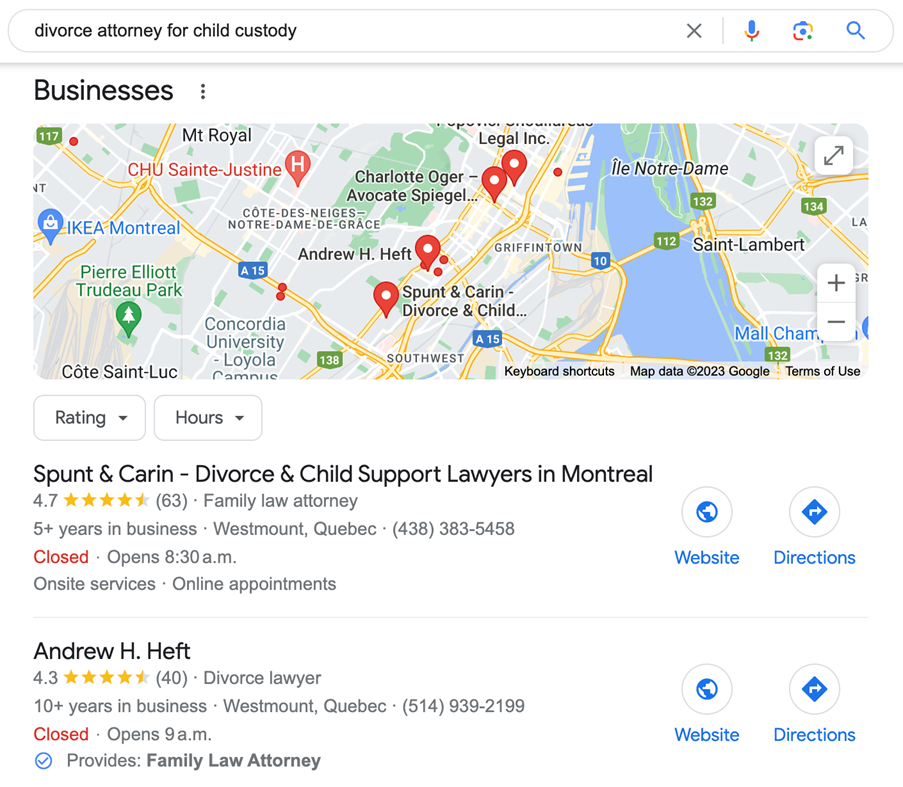
This is the Google Local 3-Pack; it displays the most reputable, reliable, and trusted businesses that provide the requested products/services in the requested region (often automatically detected based on the user’s location).
This is where understanding the human psyche becomes imperative. Web users love convenience and speed. They want accurate, reliable, and relevant search results in the shortest possible time.
And they trust Google!
When Google displays certain businesses at the very top, people don’t bother scrolling all the way down; they directly explore the topmost options.
If you’re not visible on the first page or in the Local-3 Pack, forget it, you’ll fail to reach your target audience.
This is why keywords are critical. When used correctly, they pull you to the top search results. The outcome? A robust online presence. And we all know what that means: more calls, more cases, more victories, more revenue!
Let’s delve deeper into the intricate art and science of keyword research for the legal domain.
1.1. Why General Isn’t Always Great
The allure of general keywords is undeniable. At first glance, terms like “lawyer” or “legal advice” appear very attractive due to their high search volumes. But the internet isn’t just a numbers game. When it comes to SEO for lawyers, it’s about quality over quantity.
By opting for general keywords, lawyers risk getting lost in the vast sea of search results, vying for attention among a plethora of unrelated listings. Broad terms mostly fetch unqualified traffic, i.e., people who bounce off your website as quickly as they arrive. Why? They may be seeking a different specialization or even a different jurisdiction altogether.
Contrast this with a targeted approach. For a family lawyer in Miami, terms like “family law expert in Miami” or “divorce attorney in Miami” will reduce competition and fetch visitors who genuinely require your expertise in their locale. Work with law firm SEO providers to master this approach.
1.2. It’s All About Research
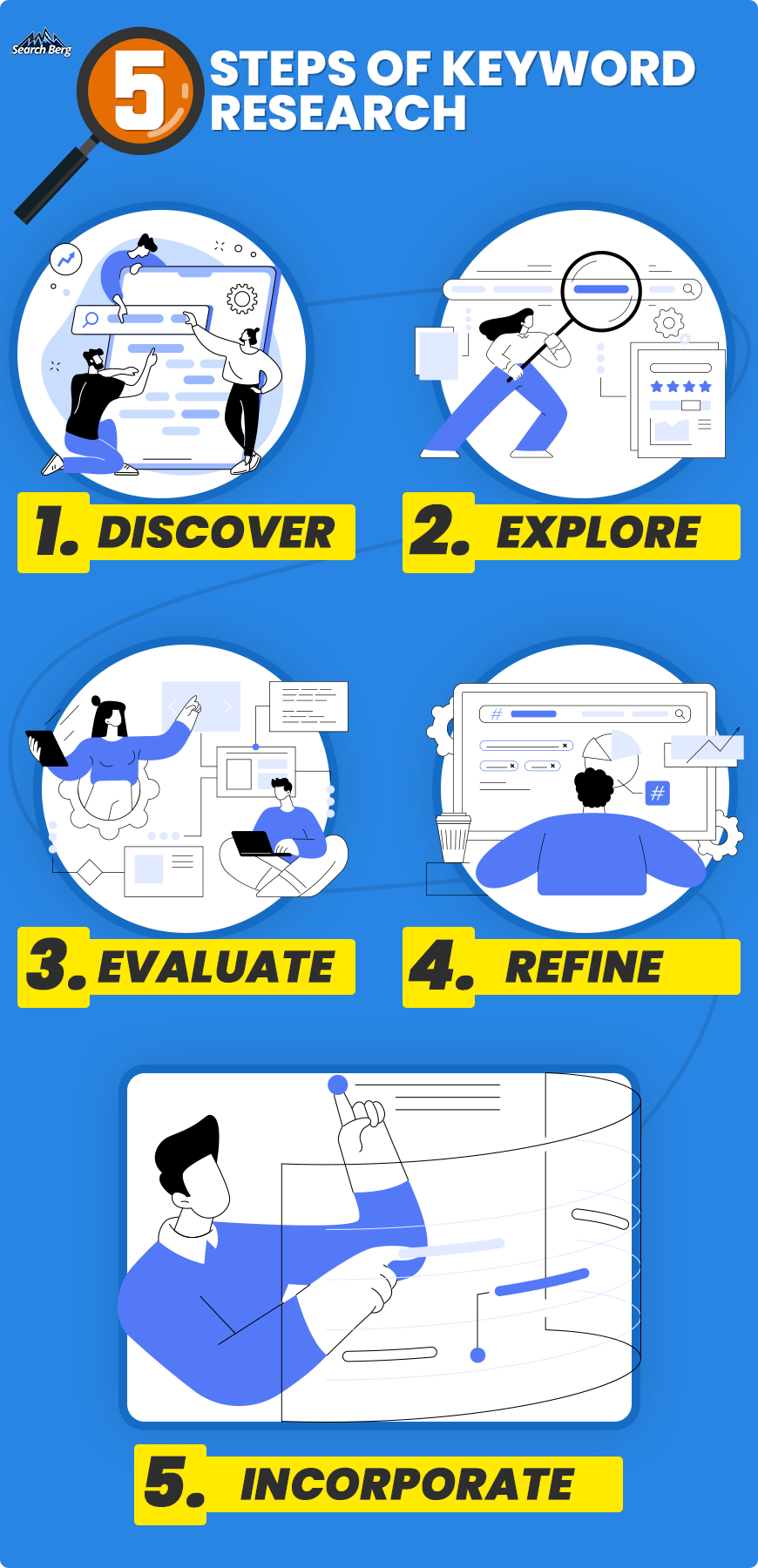
Nothing holds a candle to the sheer importance of keyword research. Nothing.
When done right, comprehensive keyword research uncovers the obvious terms your clients may use and the nuanced, sometimes less obvious phrases they type into their search bars.
Lawyers get a bird’s eye view of the digital landscape. You’ll shed light on critical areas like search volume, competition, and even user intent. This isn’t just about knowing the most popular terms; it’s about understanding your audience’s language and tailoring your content accordingly.
For instance, a lawyer may instinctively come up with a keyword like “top lawyer in New York.” However, comprehensive research may reveal that potential clients are more interested in “best family attorney for divorce cases in Manhattan” or “trusted legal advice for child custody in Brooklyn.”
These long-tail keywords (often less competitive and more targeted) could be the golden tickets to connecting with a niche audience looking for specialized services. And while intuition plays a role, there’s no substitute for genuine data to guide these insights!
Your best call? Opting for professional SEO services that include comprehensive keyword research. This is a great way to ensure you cover as much ground as possible.
SEO experts use advanced tools to uncover the most relevant keywords for each lawyer’s niche. You’ll end up with a robust set of monthly keywords that help you claim the top search results.
In the meantime, however, you can also play around with Google Keyword Planner. This is a foundational tool that provides data on search volume, competition, and forecasts on future trends.
While it lacks the robustness of cutting-edge tools used by expert SEO service providers, it’s a good starting point. Use it to learn the ropes until you upgrade to professional SEO services.
1.3. Clever Keyword Incorporation
While keyword research is important, it’s not enough. You can’t simply compile a list of relevant keywords and call it a day. You must learn the right way to incorporate them into your website for greater online visibility, stellar search engine rankings, high traffic, and maximum conversions.
Keywords should be strategically placed in key elements of your website. This includes titles, headings, subheadings, and the main content.
For instance, if you’re a criminal defense attorney specializing in drug cases, you may use keywords like “drug crime defense” or “drug possession lawyer.” These keywords should be included in your homepage title, relevant service pages, and even blog headers.
Keyword stuffing (stuffing your content with keywords) can negatively impact both user experience and SERP rankings. Avoid it at all costs. Instead, incorporate keywords naturally, seamlessly, and evenly into your content. Create content that flows smoothly, provides value to the reader, and aligns with their search intent.
If you want to claim the top Google SERP spots, start diversifying your content. FAQs, for one, are a goldmine. Consider compiling a list of questions potential clients commonly ask. Craft detailed answers that incorporate relevant keywords.
For instance, a bankruptcy attorney may address questions like “How does Chapter 7 bankruptcy work?” or “Can I keep my house if I file for bankruptcy?” See what we mean?
Case studies are another great move. Sharing success stories through case studies is an excellent way to highlight your expertise and demonstrate your ability to handle complex legal situations. Each case study can be optimized with keywords related to the specific legal issues involved.
And, of course, the importance of local keywords cannot be ignored. Unless you run a multi-million law firm, chances are you target a couple of towns, cities, or states. Perhaps an entire nation or two, at best.
Since your reach is “local,” your keywords should also be local. Incorporating local keywords into your content is an excellent way to capture and convert local search traffic. We’ll dive deeper into local SEO later in this blog.
2. Content Creation
Search engines favor websites that produce relevant, high-quality content. Content updates signal to search algorithms that your website is a valuable resource.
The outcome? Stellar online visibility and greater chances of securing a coveted spot in the top search rankings.
Content goes beyond mere words; it sparks conversations, fosters sharing, and cultivates communities around your legal expertise. Engaging content transcends legal jargon; it delves into relatable narratives, addresses common concerns, and participates in broader conversations within your practice area.
How can you master this art as an up-and-coming lawyer? Let’s show you the way!
In the realm of law, reputation is everything. When an attorney walks into a courtroom, their past cases, manner of argumentation, and even the respect they command from their peers play a substantial role in their current case.
In the digital domain, especially when it comes to content creation, a similar principle applies. Demonstrating authority isn’t just about showcasing credentials or a list of cases won; it’s about earning audience trust, building credibility, and positioning yourself as a thought leader.
When you demonstrate authority through your content, you tell prospective clients that you know your field, you’ve navigated its complexities, and you have the expertise to guide them.
This is particularly vital for lawyers. Why? When individuals seek legal advice or representation, they’re not just looking for information; they’re looking for expertise they can rely on during some of the most challenging moments of their lives.
Demonstrating authority, however, goes beyond merely claiming it. In content, it’s exhibited by a thorough understanding of the topic at hand. This could mean delving deep into case laws, understanding the intricacies of legal processes, and presenting well-researched, articulate arguments on various issues.
Citations from landmark cases, references to established legal theories, and real-life examples of your experiences can further bolster your authority.
Additionally, the way you address commonly asked questions or widespread misconceptions about legal matters can set you apart. By providing clear, concise, and insightful answers, you’re not just offering information, but you’re showcasing depth and expertise.
The end game of demonstrating authority is audience trust. This is the deciding factor between a potential client choosing your services over another attorney’s.
How can you solidify your online reputation? By consistently delivering authoritative content, being thorough in your research, staying updated with legal trends and changes, and providing value to your audience.
In the courtroom, a lawyer’s reputation precedes them. On the internet, your content becomes your spokesperson, advocating for your authority in every line and paragraph.
Sanocki Newman & Turret is an excellent example. Their rich blog is filled with engaging, informative, and relevant blog posts structured around their practice areas. Their team routinely dissects complex legal theories, sheds light on the penalties for different crimes, discusses effective defense strategies, outlines the right course of action to take in diverse legal scenarios, introduces new perspectives on existing laws, and does so much more.
Their latest “Know Your Rights” series is nothing short of brilliant. It sends a clear message to readers that they have rights they may not be aware of. This instills a sense of empowerment. Before they even delve into the intricacies of the topic, readers already feel valued and seen.
While the overarching theme remains consistent, the diverse range of topics ensures that a wide net is cast. Whether someone is grieving an unexpected loss or facing the aftermath of medical negligence, there’s a dedicated space for them tailored to their specific ordeal.
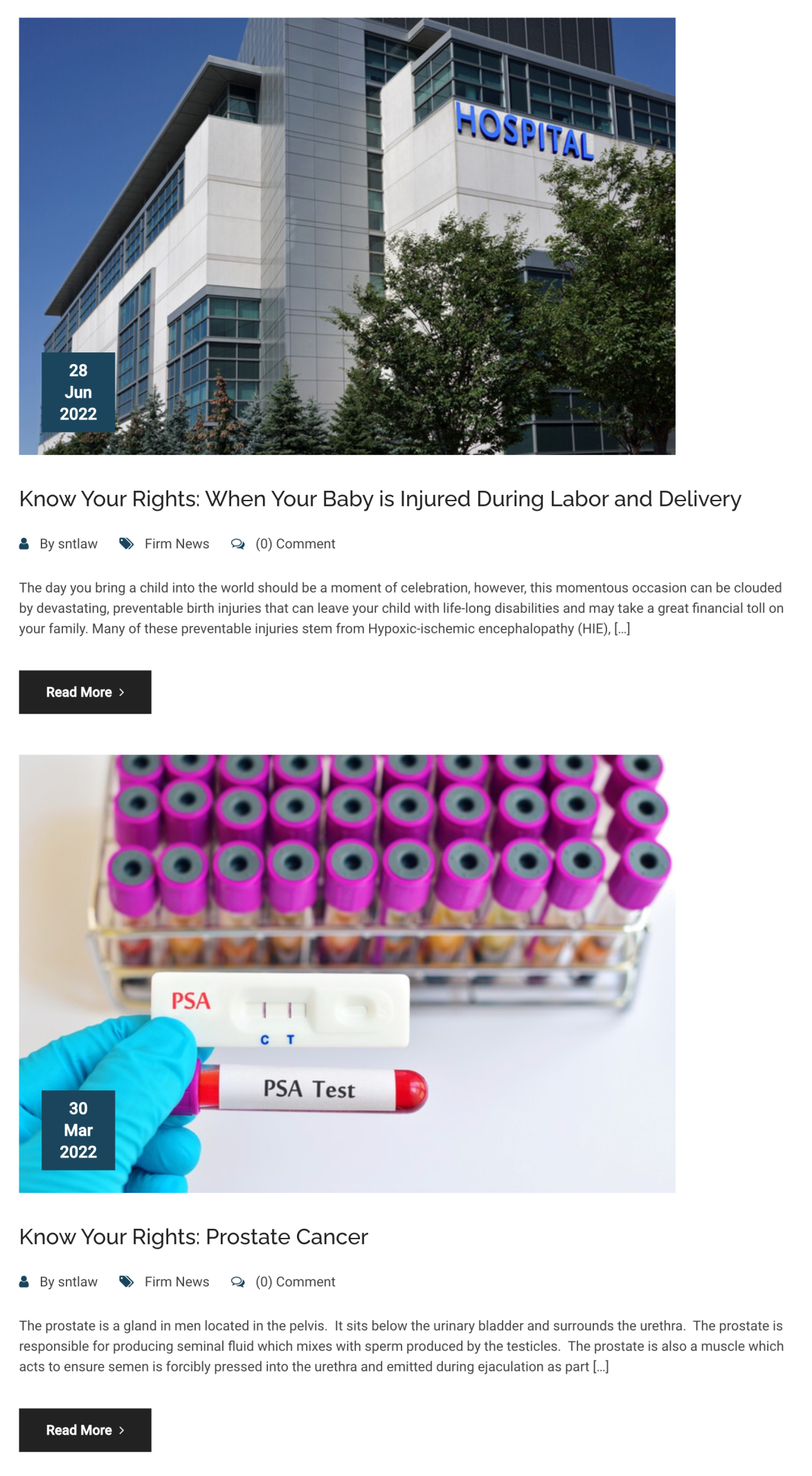
Mary Beth Harrell’s blog is also a masterclass in exceptional content. Their diverse topics, comprehensive knowledge, and consistency help them win over their audience and stay in Google’s good books.
Instead of providing run-of-the-mill information, the law firm delves deeper into the local crime scene: news, cases, charges, penalties, defenses, tips, and so much more. Their all-encompassing approach has helped them build a wide audience and, of course, loyal clientele.
Here’s a peek at their engaging, information-packed, and useful blog posts:

But, wait. How exactly does content boost your online visibility? Yes, you end up engaging your audience, but how do you put a metaphorical smile on Google’s face?
Here’s how.
When you create authoritative content, Google starts viewing you as an industry leader. While a lot of lawyers are creating content out there, very few are providing exceptionally high-quality, comprehensive, authoritative, and trustworthy content that doesn’t miss the mark.
Once you start checking this box off the list, Google will take notice and start elevating your rankings.
Let’s test this, shall we? The law firm we mentioned above, Mary Beth Harrell, is known for its crisp content. The firm is primarily based in Texas. If we type “best lawyers in Texas” in the Google search bar, guess what shows up!
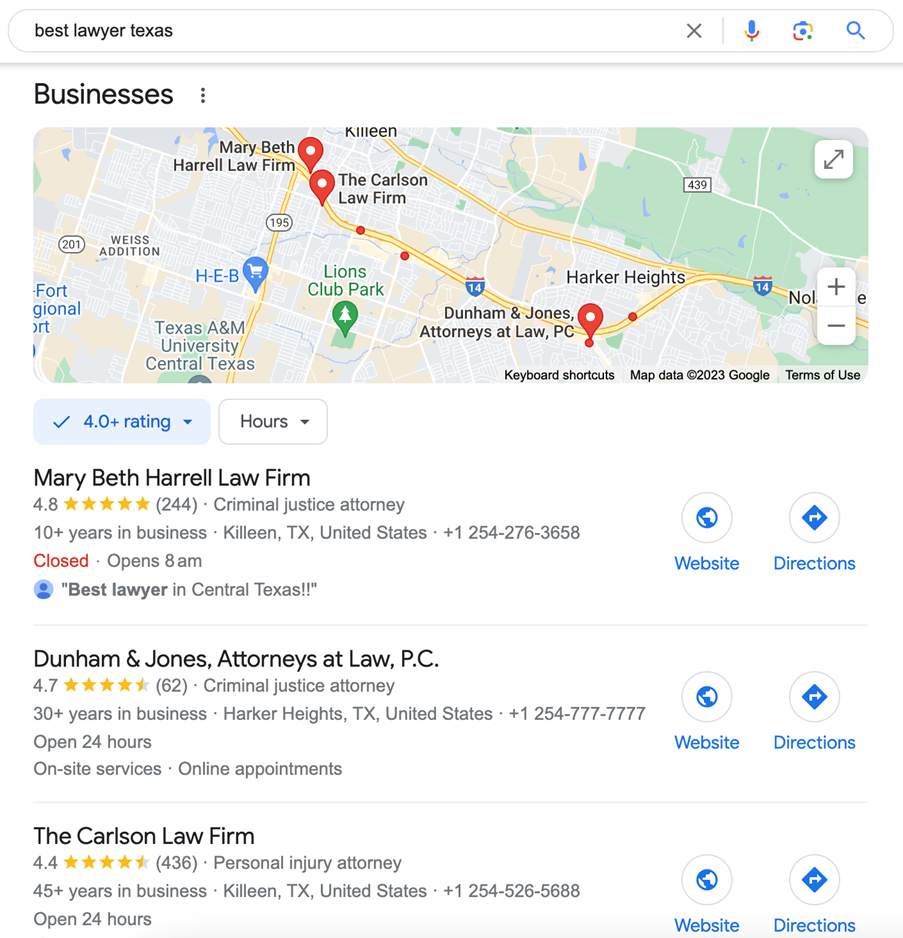
See how this works? Quality content never misses. When you feed Google with the crème de la crème of legal content, the content-loving platform will reward you with enviable rankings.
But this is easier said than done. Authoritative content requires exceptional research, planning, writing, and editing skills. Instead of handing this critical task over to your in-house team, hire SEO services that include SEO content writing.
Additionally, opt for law firm SEO over regular SEO. This is a great way to ensure your content writing team comprises professionals with a background in law. Lawyer SEO means your SEO team specializes in both SEO and law; you’ll get the best of both worlds. And that’s exactly what you need to stand out online.
Recommended Read: What Type of Content is Best for SEO?
3. Quality Backlinks to the Rescue
In the realm of law, a referral is gold. It’s an endorsement from one trusted professional to another. The digital world has its own version of these commendations: backlinks.
When a reputable website links to your law firm, it gives you a nod of approval and vouches for your content’s credibility and value. By now, you should already know that Google trusts its biggest players.
The domain authority (DA) score plays a critical role here. This score determines how authoritative, trustworthy, reputable, and reliable a website is. The higher the score, the greater their credibility!
For instance, Forbes has a DA score of 95 (pretty impressive). If Forbes gives a shoutout to a law firm in their content, Google will trust the firm by virtue of association.
It’s like if Meryl Streep raved about an up-and-coming actor. You’d definitely give the newbie some attention, wouldn’t you? Perhaps you’d even watch their debut movie!
This is how the online world works. When Google’s favorite websites applaud other websites, Google definitely takes notice and elevates their rankings. And what makes all this happen? You guessed it. Backlinks!
3.1. Building a Strong Backlink Profile
The art of building backlinks mirrors the intricacies of establishing a reputable legal practice. Just as a fledgling attorney wouldn’t want to be associated with questionable figures in the legal community, a website must be wary of the type of links it earns.
Building a robust backlink profile requires strategic vision, due diligence, and unwavering commitment to quality. Here’s a detailed breakdown of how to construct this digital edifice:
- Commitment to Quality Content
The Bedrock: Like a solid legal argument, your website’s content is foundational. Before venturing out for backlinks, make sure your site boasts valuable, well-researched, and up-to-date content that others would naturally want to reference.
Specificity: Lawyers understand the value of specificity. Instead of producing generic legal advice, create content that digs deep into niche legal areas. This can make your content the go-to reference point for specific legal queries.
- Guest Posting with Intent
Showcase Expertise: Offering guest posts to authoritative legal publications or blogs is an excellent way to tap into their readership. It’s akin to a lawyer guest lecturing at a law school. The authority of the school (or, in this case, the website) lends credibility to the lecturer (or guest blogger).
Avoid Over-Saturation: As tempting as it may be to guest post everywhere, be selective and target platforms that resonate with your expertise to ensure your links hold more value.
- Foster Digital Relationships

Engagement: Engage with fellow legal bloggers or influencers. Share their content, engage with their posts, and initiate conversations. Much like building relationships in the legal community, this goodwill often results in organic link-sharing and mutual promotion.
Collaborations: Partner with other legal experts for webinars, podcasts, or joint articles. These collaborative efforts often lead to natural link exchanges. It’s like feeding two birds with one scone; both parties benefit immensely.
- Leverage Visual Content
Infographics: The legal world is rife with data, statistics, and trends. Convert these into compelling infographics! Visual content tends to be shared more. The outcome? A steady stream of backlinks.
Opt for professional infographic design services to wow your audience with clean, crisp, engaging, and visually satiating infographics. It’s possible that infographic design is already a part of your lawyer SEO plan. Speak with your SEO service providers to confirm.
Videos: If your firm conducts seminars or workshops, consider making them available online. Encourage others to embed your videos on their sites.
- Local Directories and Associations
Visibility: Ensure your law firm is enshrined in prominent legal directories and associated with bar associations. These are great ways to earn authoritative backlinks and cement your firm’s position in the local legal landscape.
Reviews and Testimonials: Encourage satisfied clients to leave reviews on platforms like Avvo or Martindale-Hubbell. Positive reviews can increase your site’s visibility and, in turn, the chances of acquiring backlinks.
- Competitive Analysis
Spy the Friendly Way: Use competitor analysis services to analyze where your competitors are getting their backlinks from. This can offer insights into potential backlinking opportunities you may have missed.
Gap Analysis: Find content gaps in your competitors’ strategies and create superior content to fill those gaps. This will bolster your content quality and make your site more link-worthy. Win-win!
3.2. Avoiding the Pitfalls
Crafting a compelling legal argument requires more than just a good understanding of the statutes; you must also possess the ability to foresee potential counterarguments and pitfalls.
Similarly, while cultivating a strong backlink profile offers numerous benefits, it also presents several traps that the uninitiated may fall into.
Let’s take a closer look at this treacherous landscape and identify the hazards that await:
- The Temptation of Quick Wins
Paid Links: Like a tempting but unethical shortcut in legal practice, buying links may seem like a quick way to enhance your profile. However, search engines, especially Google, have become adept at identifying and penalizing these actions. Remember, there’s no substitute for authenticity, both in law and SEO.
- Spammy Links

Quantity Over Quality: A rookie mistake is chasing the number of backlinks without considering their quality. One quality backlink from an authoritative legal site is worth more than a dozen links from unrelated or low-authority sites. It’s akin to having one expert witness testimony over multiple unreliable statements in court.
- Over-Optimized Anchor Text
Avoid Red Flags: Continually using exact-match keywords as anchor text can raise flags with search engines. This practice is very similar to a lawyer using too much legal jargon in a public plea; it can seem insincere and overdone.
Aim for natural distribution of anchor text; mix branded terms, generic terms, and various keyword permutations.
- Ignoring Relevance
Stay in Your Lane: A link from a renowned culinary blog may be authoritative, but it doesn’t make much sense for a legal site. It’s like a tax attorney trying to represent someone in a criminal trial. While they’re both lawyers, the expertise doesn’t translate. Stick to your niche.
- Neglecting the ‘NoFollow’ Attribute
Balance Your Portfolio: In the world of backlinks, ‘nofollow’ links tell search engines to disregard the link in terms of ranking. While they may seem ineffective, they add a layer of naturalness to your link profile. It’s similar to a lawyer taking on both high-profile and pro-bono cases; it showcases versatility and authenticity.
- Stagnation
Avoid Resting on Your Laurels: Even if you’ve built a fantastic backlink profile, the internet is dynamic. Links can break, sites can lose authority, or links can be removed.
As a lawyer, would you ever stop updating yourself on the latest legal precedents? You wouldn’t. Similarly, never make the mistake of failing to regularly review and update your link profile; it can lead to stagnation.
- Not Considering User Experience
More than Just Links: The ultimate goal is to provide value to your audience. A link should add context or offer additional information to the reader. If it feels forced or unrelated, it detracts from the user’s experience.
Much like in law, where every citation or reference should add value to the case, every link should enrich the user’s journey.
4. Local SEO
Legal practices are jurisdiction-bound. Similarly, local businesses, including law firms, should be ‘search-bound’ to their physical locations.
A potential client in distress after a car accident isn’t going to look for an attorney three states over. They’ll search for a lawyer nearby, one familiar with local regulations and nuances. Local SEO ensures you’re the attorney they find first.
4.1. Google Business Profile (GBP)
Think of the internet as a sprawling city with countless billboards. Google Business Profile (GBP) is your personalized, prime-location billboard that does more than just advertise; it engages, informs, and converts. It’s the digital equivalent of a law firm’s physical office placed right in the heart of the city!
Creating and optimizing a GBP listing is akin to designing an inviting office space. The exterior, i.e., the listing details, must be immaculate. This means ensuring your firm’s name, address, and phone number (NAP) are accurate.
Photos act as the interior décor; they give potential clients a glimpse of your firm’s ambiance, team, and the environment they should expect. Consistent updates, posts, and event announcements are your open-door days. This is your chance to welcome the local community to interact and engage!
GBP reviews serve as personal testimonials. Positive feedback will boost your firm’s credibility, and even negative reviews, when addressed professionally, will showcase your commitment to client satisfaction.
The more information you provide, the better. Let’s be honest: Google’s algorithms are modern-day gatekeepers. They decide who gets seen and who gets lost in the digital wilderness. By feeding them accurate and detailed information, you’ll give them all the evidence they need to rank you higher in local searches.
Keep up with the evolving GBP landscape to make changes over time. A power-packed Google Business Profile plan is a part of any successful local law firm marketing plan. A little fine-tuning here, a little fine-tuning there, and your GBP will become a common sight in the Local 3-Pack!
4.2. Local Content
Creating content isn’t just about disseminating information. It’s about connecting with your local audience in a language they understand and meeting their specific needs.
Localized content is tailored to reflect a specific geographical audience’s needs and interests. For law firms, this could mean writing about local legal news, recent high-profile cases in the area, or jurisdiction-specific legal guidelines.
Imagine a lawyer in San Francisco publishing articles about recent tech-industry-related legal disputes. This means their firm is abreast with local happenings and understands the importance of curating content for the city’s tech-savvy populace.
Embrace local vernacular and references to make your content more relatable. An article that highlights the implications of a recent change in state law becomes more impactful when supplemented with local examples or historical context.
This hyper-local approach is an excellent way to boost search visibility for local queries and foster trust among local clients. Sign up for professional SEO services that come with local content creation and optimization.
5. Technical SEO

While captivating content, backlinks, and keywords often steal the limelight, technical SEO diligently works backstage to ensure every element of your website performs at its peak.
Just as every courtroom requires a solid infrastructure (well-functioning microphones, clear acoustics, proper lighting, etc.) for the trial to proceed smoothly, a law firm’s website needs a robust technical foundation for seamless user experience and higher search engine rankings.
- Site Architecture
Site architecture is the organization and layout of a website’s content (including how web pages are linked to and from each other). Well-structured site architecture enhances user experience and helps search engines understand the priority of content.
Effective site architecture is built around the user’s journey and needs. It streamlines navigation and helps visitors find the information they’re looking for.
Proper categorization, clear labeling, and a logical flow all contribute to a site’s architecture. The goal is to ensure users spend more time on the website, reduce bounce rates, and increase the chances of conversions.
Example: Consider the example of a law firm that specializes in multiple areas like personal injury, family law, and criminal defense. Instead of lumping all services under a generic “Services” tab, they could set up a dropdown menu under “Services” and carefully list each practice area. Each of these categories can then have sub-pages discussing specific cases or issues relevant to that domain.
This is a great way to ensure both users and search engines can easily navigate the services, understand their scope, and access relevant information effortlessly. The outcome? Enhanced online visibility.
- Robots.txt and XML Sitemaps
Robots.txt is a standard used by websites to help web crawling and scraping bots understand which pages should not be processed or scanned. By defining these rules, websites can control which parts of their site are accessible to search engines. This is a great way to ensure irrelevant or sensitive pages remain private.
XML sitemaps, conversely, serve as a roadmap for search engines. They list a website’s essential pages and make sure search engines are aware of all the critical content that should be indexed.
Example: Let’s say a law firm has a “Staff Portal” or “Client Login” section on its website. Using the Robots.txt file, they can instruct search engines not to crawl these pages and ensure their private sections remain unindexed.
On the flip side, if they’ve recently added a series of articles or a new practice area to their portfolio, an updated XML sitemap submitted to search engines can expedite indexing.
- Site Speed and Core Web Vitals
Site speed is an essential metric for user experience and SEO. If a website takes too long to load, people are more likely to abandon it, resulting in a higher bounce rate and poor rankings.
With mobile browsing surpassing desktop, the importance of a fast-loading site (especially on mobile devices) has never been more critical.
Core Web Vitals are a set of specific factors Google considers important in a webpage’s overall user experience. They measure web usability dimensions like load time, interactivity, and the stability of content as it loads. These metrics are increasingly becoming a deciding factor in how Google ranks pages.
Example: A law firm’s website may boast a comprehensive homepage with a video background, client testimonials, case studies, and a live chat feature. However, if these elements aren’t optimized, the page could become too heavy.
By compressing media files, leveraging browser caching, and implementing other speed-boosting techniques, the firm can ensure users access the content rapidly. Google will pick up on this and reward the site with better rankings.
Technical SEO isn’t fun and games; it requires a good grasp of the terrain. While you may feel compelled to take things into your own hands, hire SEO services to rest assured that the job will be completed to perfection without any errors or lapses.
Raise Your Online Gavel with Search Berg!
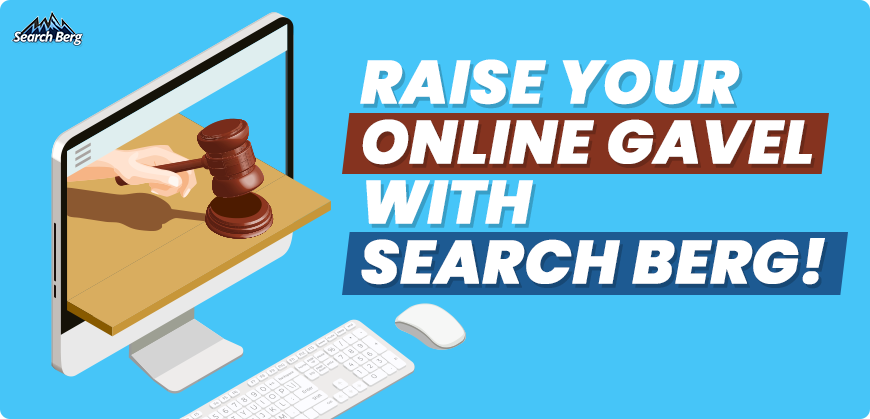
Effective law firm SEO is contingent on experience, expertise, professionalism, and the right tools. At Search Berg, we bring all of this to the table.
We don’t just dabble in SEO; we specialize in it. Our team is a fusion of SEO experts and professionals with a background in law. We understand the nuances of the legal landscape and the complex algorithms that govern online visibility.
By crafting a power-packed SEO plan for your law firm, we help you get seen online, get more calls, and get more clients; that’s the Search Berg promise.
Start exploring our SEO services for lawyers to get started! When it comes to SEO for lawyers, Search Berg is the gold standard. Let’s show you what a high-ranking, successful, and visible website looks like!












